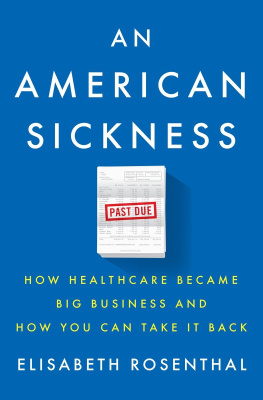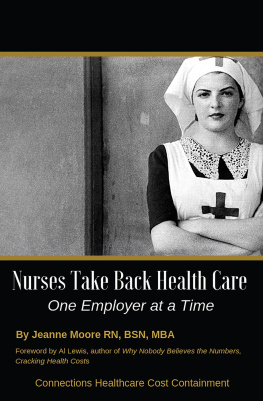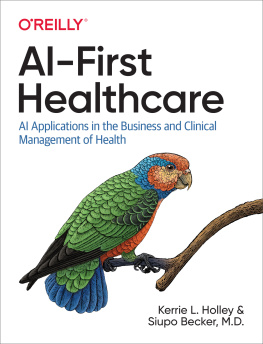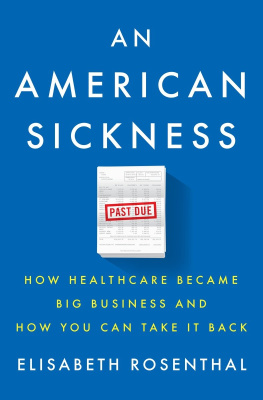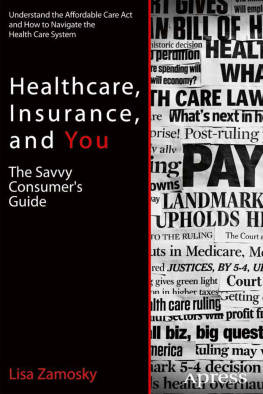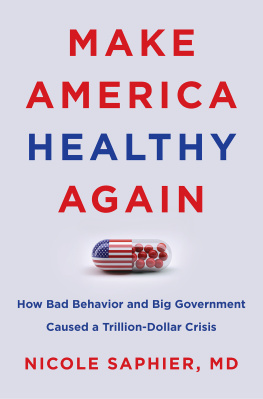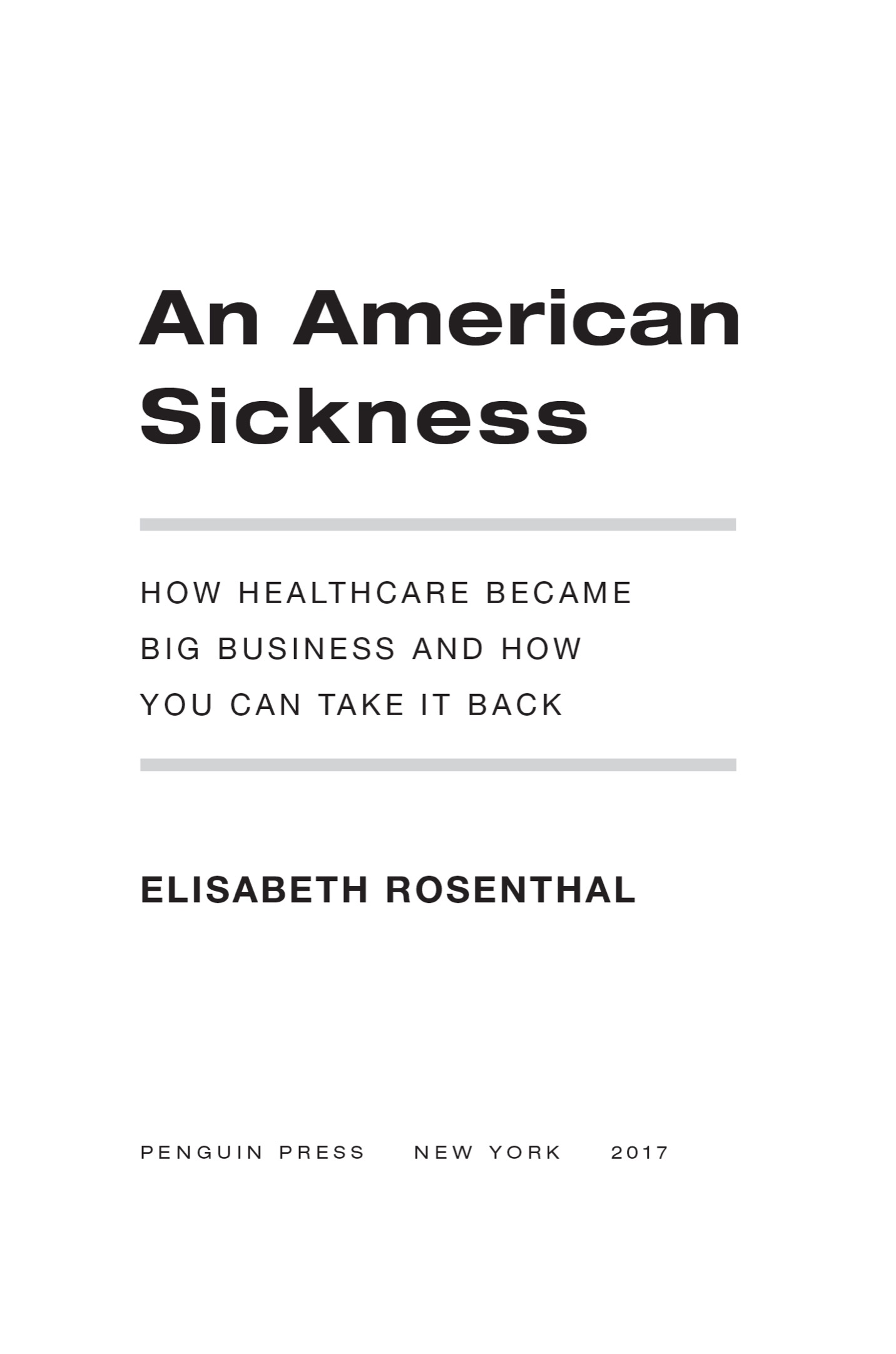PENGUIN PRESS
An imprint of Penguin Random House LLC
375 Hudson Street
New York, New York 10014
penguin.com
Copyright 2017 by Elisabeth Rosenthal
Penguin supports copyright. Copyright fuels creativity, encourages diverse voices, promotes free speech, and creates a vibrant culture. Thank you for buying an authorized edition of this book and for complying with copyright laws by not reproducing, scanning, or distributing any part of it in any form without permission. You are supporting writers and allowing Penguin to continue to publish books for every reader.
Library of Congress Cataloging-in-Publication Data
Names: Rosenthal, Elisabeth, 1956 author.
Title: An American sickness : how healthcare became big business and how you can take it back / Elisabeth Rosenthal.
Description: New York : Penguin Press, 2017.
Identifiers: LCCN 2016042934 | ISBN 9781594206757 (hardcover) | ISBN 9780698407183 (e-book)
Subjects: LCSH: Health careUnited States. | Medical careUnited States. | Medical policyUnited States. | BISAC: MEDICAL / Health Policy. | BUSINESS & ECONOMICS / Insurance / Health. | POLITICAL SCIENCE / Public Policy / Social Policy.
Classification: LCC RA395.A3 .R655 2017 | DDC 362.10973dc23
LC record available at https://lccn.loc.gov/2016042934
Neither the publisher nor the author is engaged in rendering professional advice or services to the individual reader. Neither the author nor the publisher shall be liable or responsible for any loss or damage allegedly arising from any information or suggestion in this book.
While the author has made every effort to provide accurate Internet addresses and other contact information at the time of publication, neither the publisher nor the author assumes any responsibility for errors or for changes that occur after publication. Further, the publisher does not have any control over and does not assume any responsibility for author or third-party Web sites or their content.
Version_2
Dedicated to all the patients, doctors, and other healthcare professionals who so generously shared their stories and experiences to bring this book to life. Waiving privacy concerns, they agreed to have their real names appear in print. In the hope of contributing to change in our healthcare system, they spent hours digging up copies of their bills, insurance statements, correspondence, and other documents to provide verification. Im deeply grateful for their help, commitment, and courage.
Theyand all Americansdeserve better, more affordable healthcare.
Contents
INTRODUCTION
Complaint: Unaffordable Healthcare
I n the past quarter century, the American medical system has stopped focusing on health or even science. Instead it attends more or less single-mindedly to its own profits.
Everyone knows the healthcare system is in disarray. Weve grown numb to huge bills. We regard high prices as an inescapable American burden. We accept the drugmakers argument that they have to charge twice as much for prescriptions as in any other country because lawmakers in nations like Germany and France dont pay them enough to recoup their research costs. But would anyone accept that argument if we replaced the word prescriptions with cars or films?
The current market for healthcare just doesnt deliver. It is deeply, perhaps fatally, flawed. Even market economists themselves dont believe in it anymore. Its now so dysfunctional that I sometimes think the only solution is to blow the whole thing up. Its not like any market on Earth, says Glenn Melnick, a professor of health economics and finance at the University of Southern California.
Nearly every expert Ive spoken withRepublican or Democrat, old or young, adherent of Milton Friedman or Karl Marxhas a theoretical explanation as to why the United States of its gross domestic product on healthcaremore than twice the average of developed countries. But each one also has a story of personal exasperation about the last time a family member or a loved one was hospitalized or rushed to an emergency room or received an incomprehensible, outrageous bill.
Stephen Parente, Ph.D., a health economist at the University of Minnesota and an adviser to John McCain in the 2008 presidential election, believes that studies overstate the excessive healthcare spending in the United States. But when he talks about the hospitalization of his elderly mother, his dispassionate academic tone shifts to one Ive heard thousands of times, brimming with frustration:
There were a dozen doctors all sending separate bills and I couldnt decipher any of them. They were all large numbers and the insurance paid a tiny fraction. Imagine if a home contractor worked this way? He estimates $125,000 for your kitchen and then takes $10,000 when its done? Would anyone ever renovate?
Imagine if you paid for an airplane ticket and then got separate and inscrutable bills from the airline, the pilot, the copilot, and the flight attendants. Thats how the healthcare market works. In no other industry do prices for a product vary by a factor of ten depending on where it is purchased, as is the case for bills Ive seen for echocardiograms, MRI scans, and blood tests to gauge thyroid function or vitamin D levels. The price of a Prius at a dealership in Princeton, New Jersey, is not five times higher than what you would pay for a Prius in Hackensack and a Prius in New Jersey is not twice as expensive as one in New Mexico. The price of that car at the very same dealer doesnt depend on your employer, or if youre self-employed or unemployed. Why does it matter for healthcare?
We live in an age of medical wonderstransplants, gene therapy, lifesaving drugs, and preventive strategiesbut the healthcare system remains fantastically expensive, inefficient, bewildering, and inequitable. Faced with disease, we are all potential victims of medical extortion. The alarming statistics are incontrovertible and well known: the United States spends nearly one-fifth of its gross domestic product on healthcare, more than $3 trillion a year, about equivalent to the entire economy of France. For that, the U.S. health system generally delivers worse health outcomes than any other developed country, all of which spend on average about half what we do per person.
Who among us hasnt opened a medical bill or an explanation of benefits statement and stared in disbelief at terrifying numbers? Who hasnt puzzled over an insurance policys rules of co-payments, deductibles, in-network and out-of-network paymentsonly to surrender in frustration and write a check, perhaps under threat of collection? Who hasnt wondered over, say, a $500 bill for a basic blood test, a $5,000 bill for three stitches in an emergency room, a $50,000 bill for minor outpatient foot surgery, or a $500,000 bill for three days in the hospital after a heart attack?
Where is all that money going?
B EFORE BECOMING A REPORTER for the New York Times, I went to Harvard Medical School and then trained and worked as a physician at what is now NewYork-Presbyterian Hospital, a prestigious academic center. To explore the American system and its ills, Ive fallen back on the history and physical, an organized and disciplined form of record keeping that every doctor uses. The so-called H&P is a remarkable template for understanding complex problems, such as sorting out a patients multitude of symptoms, in order to come to the proper diagnosis and to allow for effective treatment. The H&P has predictable components:

